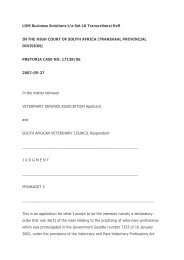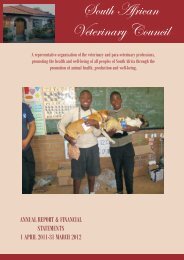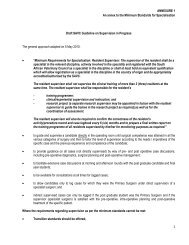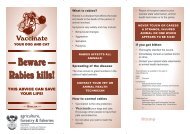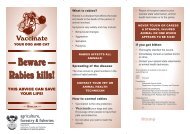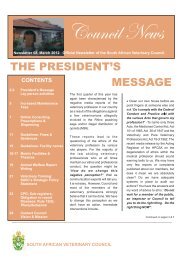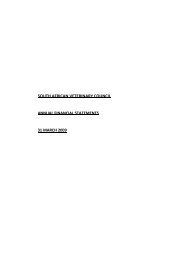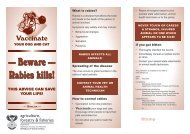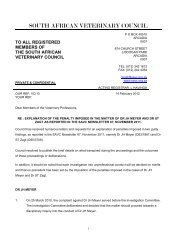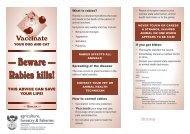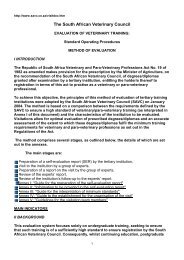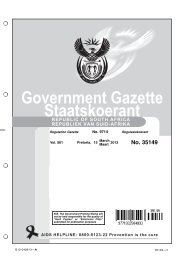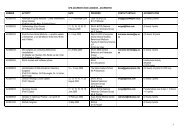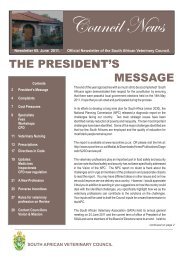Rabies Guide 2010.pdf - the South African Veterinary Council
Rabies Guide 2010.pdf - the South African Veterinary Council
Rabies Guide 2010.pdf - the South African Veterinary Council
Create successful ePaper yourself
Turn your PDF publications into a flip-book with our unique Google optimized e-Paper software.
Conditions for importation and validity of rabies<br />
vaccinations are determined by <strong>the</strong> importing<br />
country. The onus is on <strong>the</strong> owner to determine <strong>the</strong><br />
requirements of an importing country. <strong>South</strong> Africa<br />
presently has agreements with Botswana, Lesotho,<br />
Malawi, Namibia, Swaziland and Zimbabwe, and<br />
<strong>the</strong>se countries accept dogs and cats from <strong>South</strong><br />
Africa accompanied by a valid vaccination certificate,<br />
where <strong>the</strong> certificate is signed by a state veterinarian,<br />
registered private veterinarian or authorised<br />
government veterinary official.<br />
Immunity is only considered valid 30 days after <strong>the</strong><br />
date of vaccination and remains valid for 12 months.<br />
Puppies and kittens under three months of age can be<br />
exported provided that <strong>the</strong>ir mo<strong>the</strong>r was vaccinated<br />
against rabies at least one month but not more<br />
than 12 months prior to <strong>the</strong> birth of <strong>the</strong> litter. This<br />
information must be recorded on <strong>the</strong> veterinary health<br />
certificate as required by <strong>the</strong> importing country.<br />
Where booster inoculations are administered before<br />
<strong>the</strong> expiry date of previous vaccinations, <strong>the</strong> certificate<br />
is valid with immediate effect.<br />
Import into <strong>South</strong> Africa<br />
The present import permit required for importation<br />
or reimportation of dogs or cats into <strong>South</strong><br />
Africa requires a health declaration certifying:<br />
• <strong>the</strong> residential status of <strong>the</strong> animal in <strong>the</strong> exporting<br />
country<br />
• that <strong>the</strong> area of origin is not under veterinary<br />
restriction for any disease to which carnivores are<br />
susceptible<br />
• that <strong>the</strong>y have not been in contact with animals<br />
infected or suspected of being infected with rabies<br />
• that <strong>the</strong>y have a valid rabies vaccination certificate.<br />
A rabies vaccination certificate is only valid if <strong>the</strong><br />
strain of vaccine used conforms to <strong>the</strong> potency<br />
standard recognised by <strong>the</strong> WHO (2,5 international<br />
units of antigen per dose) and <strong>the</strong> animal was<br />
Conditions for importation<br />
and validity of rabies<br />
vaccinations are determined<br />
by <strong>the</strong> importing country.<br />
The onus is on <strong>the</strong> animal’s<br />
owner to determine <strong>the</strong>se<br />
requirements<br />
vaccinated at least 30 days, but not longer than 12<br />
months prior to export to <strong>South</strong> Africa.<br />
Alternatively, puppies under <strong>the</strong> age of three months<br />
may be vaccinated at any age after birth, but must<br />
<strong>the</strong>reafter be revaccinated at three months, and<br />
boosted according to <strong>the</strong> schedule.<br />
In addition, animals under three months of age are<br />
considered to have valid vaccination provided <strong>the</strong>ir<br />
dam was vaccinated at least 30 days, but not more<br />
than 12 months prior to giving birth.<br />
It is important to note that such animals must be<br />
vaccinated against rabies at three months of age<br />
in <strong>the</strong> Republic and <strong>the</strong> owner is obliged to <strong>the</strong>n<br />
inform <strong>the</strong> <strong>South</strong> <strong>African</strong> veterinary authorities.<br />
In addition, dogs should be free of Brucella canis,<br />
Trypanosoma evansi, Babesia gibsoni, Dirofilaria<br />
immitis and Leishmaniasis.<br />
The legislation governing import and export of<br />
domestic animals and wildlife is extensive and subject<br />
to continuous revision and amendment. Persons<br />
requiring fur<strong>the</strong>r information on permits are advised<br />
to contact <strong>the</strong>ir nearest state veterinarian or to write<br />
directly to <strong>the</strong> Director: <strong>Veterinary</strong> Services, Private<br />
Bag X138, Pretoria 0001.<br />
49



